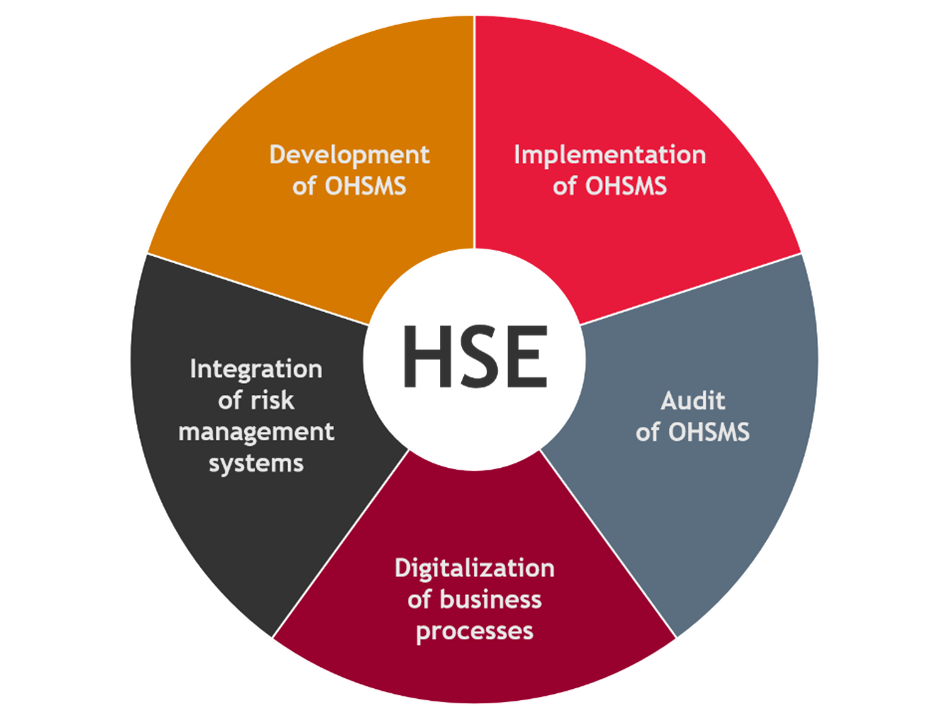In today's world, where workplace safety and standards are becoming increasingly prioritized, the companies must actively adapt their systems to new requirements. One promising approach is transitioning to the HSE (Health, Safety, and Environment) system, which combines standards and practices of occupational health, safety, and environmental aspects.
Regular review and updating of the occupational health and safety system are critical for ensuring the safety and protection of employees. The need for changes may arise from legislative changes, new technologies or processes, as well as an increase in the number of accidents or occupational diseases. Negative impact on employee satisfaction levels, as well as non-compliance with new standards and approaches, may signal inefficiency and the need to update the occupational health and safety system. Conducting audits identifies weak areas that require correction or modernization, and emphasis on safety culture becomes a key aspect of implementing an effective system.
Constant monitoring and regular audits play a crucial role in ensuring compliance with new standards and identifying areas for further improvement. Also, integrating environmental aspects into management decisions enhances efficiency and makes the company more environmentally responsible.
By actively implementing an HSE system, companies can not only ensure the safety of their personnel but also reduce their negative impact on the environment, increase efficiency, and become more competitive in the market.
Overall, continuous improvement of the HSE system allows the company to adapt to changes in legislation and technologies, creating a safe and environmentally balanced work environment.
Implementing HSE has a significant impact on the efficiency and stability of a company's operations. It not only reduces the risks of accidents but also increases productivity and employee satisfaction. Moreover, a responsible attitude towards environmental safety positively impacts the company's reputation, building trust among consumers and the public.
Innovative technological tools are essential in the future concept of HSE for Ukraine, as they contribute to increased efficiency and safety of industrial processes. Applying modern solutions in medicine, ecology, transportation, and energy helps ensure a high standard of occupational health, improve working conditions, and reduce environmental impact.
These solutions and technologies can support the creation of the future city of Ukraine, which will be efficient, safe, comfortable and environmentally friendly for its residents.
The expertise of the team of BDO in Ukraine ensures the creation of unique strategies for the implementation of HSE standards, given the specifics of each business:

Integration of an effective HSE system into a company's operations is a key factor in its success. Such a system not only ensures employee safety and environmental protection, but also supports economic resilience and sustainable business development. BDO in Ukraine can provide professional experience and knowledge to achieve these goals, increasing the efficiency and competitiveness of your business in the market.
The need for changes in the occupational health and safety system requires a comprehensive approach and the implementation of new standards, such as HSE (Health, Safety, and Environment):
- The key step in this process is risk assessment, which allows identifying main threats and risks and building an HSE system of measures to prevent accidents and improve safety.
- Implementation of HSE management systems according to international standards, including ISO 45001 and ISO 14001, is crucial. This creates a reliable basis for ensuring the safety and health of employees, as well as the company's environmental responsibility.
- Training employees and fostering a conscious safety culture are essential parts of this process. Involving employees in improving the system, along with training, strengthens the internal safety culture.
Constant monitoring and regular audits play a crucial role in ensuring compliance with new standards and identifying areas for further improvement. Also, integrating environmental aspects into management decisions enhances efficiency and makes the company more environmentally responsible.
By actively implementing an HSE system, companies can not only ensure the safety of their personnel but also reduce their negative impact on the environment, increase efficiency, and become more competitive in the market.
Overall, continuous improvement of the HSE system allows the company to adapt to changes in legislation and technologies, creating a safe and environmentally balanced work environment.
Implementing HSE has a significant impact on the efficiency and stability of a company's operations. It not only reduces the risks of accidents but also increases productivity and employee satisfaction. Moreover, a responsible attitude towards environmental safety positively impacts the company's reputation, building trust among consumers and the public.
Innovative technological tools are essential in the future concept of HSE for Ukraine, as they contribute to increased efficiency and safety of industrial processes. Applying modern solutions in medicine, ecology, transportation, and energy helps ensure a high standard of occupational health, improve working conditions, and reduce environmental impact.
Innovations in HSE are a key factor in creating a sustainable and safe working environment in Ukraine. They can include solutions and technologies such as:
- Medical and Social Innovations: Implementation of modern technologies in companies for safe work execution, barrier-free solutions in urban planning, and in medical institutions, including telemedicine and electronic medical records.
- Ecosystems and Green Technologies: Preservation and development of green areas, as well as the use of technologies to improve the city's ecology.
- Smart Transportation Management: Use of modern technologies to optimize traffic flow, given the traffic, ecology, and comfort for residents.
- Energy Efficiency and Renewable Energy: Implementation of modern energy management systems, as well as the use of renewable energy sources.
- Smart Homes and Automation: Use of Internet of Things (IoT) technologies to control lighting, heating, security, and other systems in homes.
- Electronic Governance and E-Services: Online service systems for city residents to receive information and perform various operations over the Internet.
- Pollution Monitoring and Management Systems: Use of modern technologies to monitor and reduce air, water, and other natural resource pollution levels.
- Smart Water Supply and Drainage: Implementation of systems that allow for effective management of water supply and sewage.
These solutions and technologies can support the creation of the future city of Ukraine, which will be efficient, safe, comfortable and environmentally friendly for its residents.
The expertise of the team of BDO in Ukraine ensures the creation of unique strategies for the implementation of HSE standards, given the specifics of each business:

Integration of an effective HSE system into a company's operations is a key factor in its success. Such a system not only ensures employee safety and environmental protection, but also supports economic resilience and sustainable business development. BDO in Ukraine can provide professional experience and knowledge to achieve these goals, increasing the efficiency and competitiveness of your business in the market.


